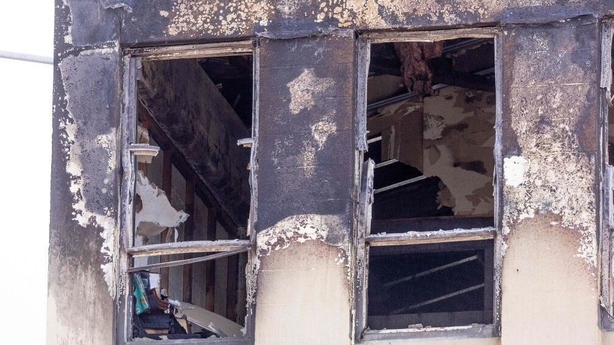Police in New Zealand have charged a man with arson over a hostel fire that killed at least six people in Wellington - the country's capital - earlier this week.
The man will face Wellington District Court tomorrow, police said, adding that further "more serious charges" in relation to the deaths have not been ruled out.
"The investigation is ongoing," they added.
Police said they were not seeking anyone else in relation to the fire, which engulfed the four-storey, 92-room hostel in the early hours of Tuesday.
Hours before announcing they had arrested and charged the man, police removed the first two bodies from the interior of the Loafers Lodge hostel in the suburb of Newtown.
Firefighters said they had located six bodies within the building but a collapsed roof on the top floor made it impossible to search everywhere.
Police say the toll may rise.
The scale of the fire shocked the country, with Prime Minister Chris Hipkins describing it at the time as an "absolute tragedy" while promising a thorough investigation.
Some survivors crawled through smoke in the dark of night to escape the blaze, while others were rescued from the rooftop by firefighters using ladders.
The remains of at least four of those killed still lie in the building.

A police reconnaissance team has been searching for evidence and trying to locate the dead since the building was declared safe for them to enter yesterday.
Fire damage inside was "extensive", police said earlier, with burned debris reaching as high as one metre.
One of the survivors, Simon Hanify, said he only escaped by chance.
Smoke alarms in the building often went off without reason, he said.
"I wasn't even going to leave my room. But I felt like a cigarette. I thought I'd go outside because I usually share them with other people," Mr Hanify said.
"There was smoke coming down the stairwell, on the ceiling and our hallway," he added.
"I've been through fire before so I did a quick lap of our floor, knocking on doors, saying 'this one's real, evacuate'."
The Loafers Lodge advertised itself as a "convenient and affordable" accommodation, with laundry, kitchen facilities and a lock on each floor.
It was used as a cheap home by a mix of long- and short-term residents, including some on lower incomes or those staying temporarily in New Zealand.
Many were shift workers, making it difficult to be sure of everyone's whereabouts at the time of the blaze.

